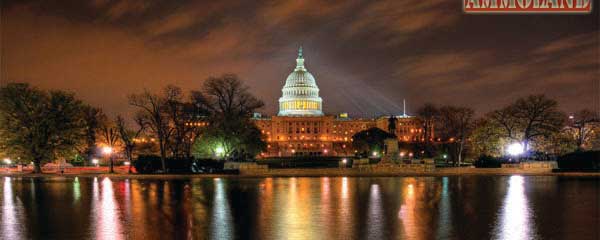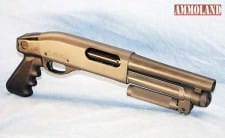

Washington, DC – -(Ammoland.com)- On January 4, 2016, the Attorney General signed a final rule amending the Bureau of Alcohol, Tobacco, Firearms and Explosives (ATF) regulations in 27 C.F.R. Part 479 to require “responsible persons” of trusts and legal entities such as partnerships and corporations to submit photographs and fingerprints when the entity submits an application to make or transfer a firearm subject to the National Firearms Act.
ATF posted the final rule on January 5, 2016, and it will become effective 180 days after the date of publication in the Federal Register.
Consequently, if the Federal Register publication occurs in the next few weeks, the effective date will be in early- to mid-July 2016.
Historical Background

The National Firearms Act (“NFA”), 26 U.S.C. Chapter 53, regulates machineguns, short barrel rifles, short barrel shotguns, silencers, destructive devices, and certain other concealable firearms known as “any other weapon.” The NFA requires such firearms be registered by their respective manufacturer, maker, or importer, and transfers must be approved in advance by ATF.
For many years, ATF regulations implementing the NFA have required applications to make firearms (filed on ATF Form 1) and applications to transfer firearms to unlicensed individuals (filed on ATF Form 4) include photographs and fingerprints of the maker or transferee. The photographs and fingerprints enables a background check of the prospective possessor to ensure he or she is not prohibited from receiving or possessing firearms under federal or state law. In the case of individuals, the Form 1 or Form 4 application also includes a certification from the local chief of police, sheriff of the county, or other chief law enforcement officer (“CLEO certification”). The certification includes a statement that the official has no information indicating receipt or possession of the firearm would place the applicant in violation of state or local law, or that the applicant will use the firearm for other than lawful purposes.
It is important to note that historically, persons associated with a legal entity, including corporations, partnerships, and trusts, did not have to provide photographs, fingerprints, or a law enforcement certification.
Notice of Proposed Rulemaking
On September 9, 2013, ATF published a notice of proposed rulemaking proposing amendments to regulations implementing the NFA as they relate to responsible persons (“RPs”) of trusts and legal entities such as partnerships and corporations. As part of its reasoning, ATF stated its concern over RPs of legal entities being excluded from background checks and other requirements designed to ensure prohibited persons do not gain access to NFA firearms. The notice proposed a number of amendments to the regulations, including a requirement that RPs for partnerships, corporations, and trusts submit photographs and fingerprints with Form 1 and Form 4 applications.
ATF received over 9,500 comments on the notice, most of them opposed to the regulation changes outlined in the notice.
Final Rule
The final rule adopts the proposal that all RPs of trusts and legal entities such as partnerships and corporations submit photographs, fingerprints, and identifying information so a background check can be conducted. Following are the changes to the regulations in 27 C.F.R. Part 479:
No CLEO Certification. The final rule eliminates the CLEO certification requirement for Form 1 and Form 4 applicants and substitutes a CLEO notification on the Form 1 and Form 4. No signature will be required from the CLEO. Instead, applicants need only certify that they have provided notification to their respective CLEOs. CLEO notification is also required for Form 5 transfers by executors of estates. Even though a CLEO certification is not required, the final rule explains the purpose of the notification is to provide notice that a resident in the CLEO’s jurisdiction has applied to make or obtain an NFA weapon and allow the CLEO the opportunity to provide ATF with any additional information that might not be available during a federal background check.
CLEO Certification of Identity. Because ATF eliminated the requirement for CLEO certification, there is also no requirement for CLEOs to attest to the authenticity of the applicant’s photographs and fingerprints. However, ATF points out in the final rule that the existing FBI fingerprint cards (FD-258) require the official taking the applicant/transferee’s fingerprints to sign the fingerprint card to certify the official has verified the identity of the applicant.
New ATF Form 5320.23, National Firearms Act (NFA) Responsible Person Questionnaire. The new questionnaire will be required from each RP as part of the Form 1, 4, or 5 submission package. Similar to the individual applicant, RPs will have to provide on the form confirmation that they have notified the CLEO in their jurisdiction. The RPs will also have to attach photographs and fingerprint cards for a background check. At the time of this writing, the proposed new Form 5320.23 has not yet been published because it is still going through the review process at the Office of Management and Budget.
Documentation Establishing Existence and Validity of Entity. Trusts and legal entities such as partnerships and corporations must submit documents evidencing the existence and validity of the entity, such as copies of partnership agreements, articles of incorporation, corporate registration, and trust attachments and schedules. ATF clarified that if the trust or other entity had a Form 1 or Form 4 application approved within the previous 24 months and there has been no change to previous documents, the entity may provide a certification that the information has not changed since the previous approval.
Definition of RP. The term “responsible person” applies only to unlicensed entities. This is an important change from the proposed rule because it does not affect federal firearms licensees who submit Forms 1, 4 and 5 to ATF. The definition in the final rule includes those persons who possess the power or authority to direct the management and policies of an entity to receive, possess, ship, transport, deliver, transfer, or otherwise dispose of a firearm for or on behalf of the entity. In the case of a trust, responsible persons include any person who has the capability to exercise such power and possesses the power under state law to receive, possess, ship, transport, deliver, transfer, or otherwise dispose of a firearm for or on behalf of the trust. The definition provides examples of RPs to include settlors/grantors, trustees, partners, members, officers, directors, board members, and owners. ATF removed beneficiaries from this “non-exclusive” list of examples of RPs. However, a beneficiary who otherwise meets the definition (e.g., a beneficiary who is entitled to possess firearms under the terms of the trust and/or state law) fits within the definition.
New RPS Not Reported to ATF. Changes in the responsible persons of trusts and legal entities such as partnerships and corporations are not required to be reported to ATF.
Transfers of Firearms After Initial Transfer or Making Approved. The final rule did not change requirements for trusts and other legal entities to submit new applications to make or transfer firearms if the entity wishes to acquire additional items after ATF approves the initial transfer. Any subsequent Form 1 or Form 4 applications must identify current responsible persons and include photos, fingerprints, and comply with the CLEO notification requirement.
Codification of Rules for Executors Transferring Registered Firearms. A new section of the regulations details the procedure for executors, administrators, and personal representatives to dispose of registered NFA firearms in estates. The executor is required, no later than the close of probate, to submit an application to transfer NFA firearms to the beneficiary on ATF Form 5. The Form 5 must be accompanied by ATF Form 5320.23 and a CLEO notification must be provided, unless the beneficiary is an individual, in which case the Form 5320.23 would not be required.
Conclusion
The final rule makes significant changes in the information required in certain Form 1, Form 4, and Form 5 applications. Elimination of the CLEO certification should streamline the application process and make it easier for consumers to obtain registered NFA firearms.
However, partnerships, corporations, trusts and other legal entities who wish to acquire NFA firearms will be required to submit significant personal information concerning RPs to enable the government to conduct thorough criminal background checks.
This requirement increases the paperwork burden and cost for such legal entities and may remove one of the incentives for their creation. Codification of the procedures for executors to follow in disposing of registered NFA firearms in estates is a positive development. Including these requirements in the regulations makes them easy to find and gives them the force and effect of law.
The above alert is for informational purposes only and is not intended to be construed or used as legal advice. Receipt of this alert does not establish, in and of itself, an attorney-client relationship.
Questions about this alert can be directed to:
- Johanna Reeves: 202.715.9941 | jreeves@reevesdola.com
- Teresa Ficaretta: 202.715.9183 | tficaretta@reevesdola.com
About Reeves & Dola
Reeves & Dola is a Washington, DC law firm that specializes in helping clients navigate the highly regulated and complex world of manufacturing, sales and international trade of defense and commercial products. We have a deep understanding of the Federal regulatory process, and use our expertise in working with a variety of Federal agencies to assist our clients with their transactional and regulatory needs.
Reeves & Dola, LLP
1775 Eye Street, NW, Suite 1150
Washington, DC 20006
202.683.4200
www.reevesdola.com
